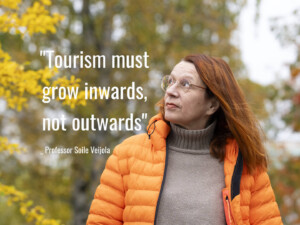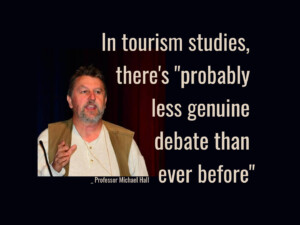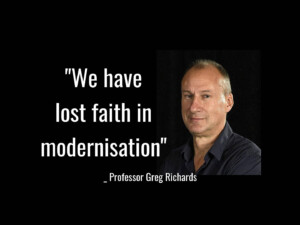Prof Richard Butler on tourism’s challenges and academia’s inadequacies
![Prof Richard Butler on tourism's challenges and academia's inadequacies 1 Professor Richard Butler on tourism’s challenges and academia’s inadequacies ... "[Don't] let wishful thinking take precedence over logic"](https://www.goodtourismblog.com/wp-content/uploads/2023/12/Prof-Richard-Butler-on-tourisms-challenges-and-academias-inadequacies-1024x768.jpg)
As most travel & tourism stakeholders rush towards an uncertain future filled with very real challenges, Richard Butler worries that academia is losing itself down ideological alleyways and critical cul-de-sacs.
The creator of Butler’s Tourism Area Life Cycle (TALC) model thinks it is important for tourism researchers and educators to check in with reality.
Prof Butler participated in a Tourism’s Horizon Interview. For this “Good Tourism” Insight, the interviewer David Jarratt summarises the highlights. [The full transcripts of the Tourism’s Horizon Interviews are available on Substack.]
Contents
- Who is Professor Richard Butler?
- The challenges facing tourism and the inadequacies of academia
- Academia’s wishful thinking during COVID-19 …
- … and scapegoating of ‘overtourism’
- Overtourism and the Tourism Area Life Cycle (TALC)
- Condescension in tourism discourse
- Academics need a reality check
- What do you think?
- About the author
- About the Tourism’s Horizon Interviews
- Featured image (top of post)
Who is Professor Richard Butler?
Richard Butler is Emeritus Professor of Tourism at Strathclyde University, Scotland and he worked for many years at the University of Western Ontario, Canada.
His primary areas of research encompass destination development, sustainability, tourism’s role in war and political change, indigenous tourism, and the dynamics of tourism in peripheral areas.
Beyond academia, Dr Butler has served as a consultant for numerous agencies, governments, and the United Nations World Tourism Organisation. In recognition of his outstanding contributions, he was honoured with the UNWTO Ulysses medal in 2016 for “excellence in the creation and dissemination of knowledge.”
Tourism lecturers and students most associate Richard with his Tourism Area Life Cycle Model (TALC), which must be the most recognised model in the field. TALC is one of the few tourism models to make it into high school curricula, such as the GCSE in the UK.
A new publication (in press via Channelview) will shed light on the contemporary relevance of TALC.
The challenges facing tourism and the inadequacies of academia
Professor Butler acknowledges that tourism faces various challenges, most notably around sustainability and carbon emissions. Indeed, he questions if it can ever be sustainable if one includes the travel element.
“Individual enterprises could and should be as sustainable as possible. That should go without saying at this point in our situation with respect to climate change and other problems.
“But creating more small sustainable operations does nothing to make a billion-tourist industry sustainable overall. Such new operations can often encourage more and longer-distance travel and often attract tourists to areas which might have been better left untouched.”
However, he argues that the academic response to this and other issues has been insufficient. For one, he contends that treating tourism as a single industry is a mistake; instead, it should be seen as fragmented necessitating nuanced approaches.
The academic discourse surrounding tourism often lacks these nuances and instead tends to act as a platform for ideological beliefs. These ‘critical’ turns and new movements better represent the ideologies of a select group of academics rather than addressing the concerns of everyday tourists or indeed the tourism industry.
Whilst it is, of course, valid for individuals to adopt these perspectives, they are not representative, and divert attention from a more genuine and balanced examination of various faults in tourism practices.
Don’t miss “GT” content tagged ‘education and training’
Academia’s wishful thinking during COVID-19 …
An example of this ideologically-informed approach is the unrealistic idea that the COVID-19 pandemic presented an opportunity to transform tourism, whereas most people and much of the industry simply desired recovery on multiple fronts.
Prof Butler:
“[E]rrors can be seen in what was to me a futile argument that COVID-19 was a great opportunity to change the nature of tourism.
“The goals of such change were entirely worthy: fewer negative impacts, fairer use of resources, reduced impacts on climate change, greater equality, and many other desirable outcomes.
“However, the chances of such changes emerging from a world shaken, scared, and suffering from the effects of the pandemic and associated restrictions […] were negligible and should have been seen as such. Instead, academic voices noted the ‘opportunity’ for great change in tourism [and] the neoliberal capitalist system that drives it.
“Nothing wrong in having that viewpoint and extolling it, but academics need to be realistic in what they foresee and not let wishful thinking take precedence over logic.”
… and scapegoating of ‘overtourism’
Another example of an ideologically-informed approach by some in the academy is the discourse on overtourism.
Prof Butler acknowledges that there can be too many tourists in certain locations at specific times but criticises the exaggeration of overtourism by some academics, and especially the media. The reframing of mass tourism as ‘overtourism’ thus positions tourism for the masses as a convenient scapegoat for broader challenges.
Citizens of desirable holiday destinations should not be seen as victims. Mass tourism has been encouraged and essentially unregulated in some European cities for many decades. Indeed, Prof Butler points out that Venetians have been selling their properties to outsiders for hundreds of years and doing well by it.
Prof Butler has more sympathy for rural areas that experience the phenomenon as a rapid, sometimes literally overnight, increase in demand.
Don’t miss “GT” content tagged ‘mass tourism and overtourism’
Overtourism and the Tourism Area Life Cycle (TALC)
Prof Butler links the age-old question of ‘how many tourists are too many?’ to his TALC model. He argues for TALC’s relevance despite criticisms of its simplicity, which in fact can be seen as one of its strengths in the view of the interviewer.
The TALC model, developed over four decades ago, can be seen as addressing essential issues related to sustainability, carrying capacity, and the intricate interactions between local and higher-level policies. However, he acknowledges the criticism that the TALC assumes continuous growth, highlighting its historical development during a period of sustained tourism growth.
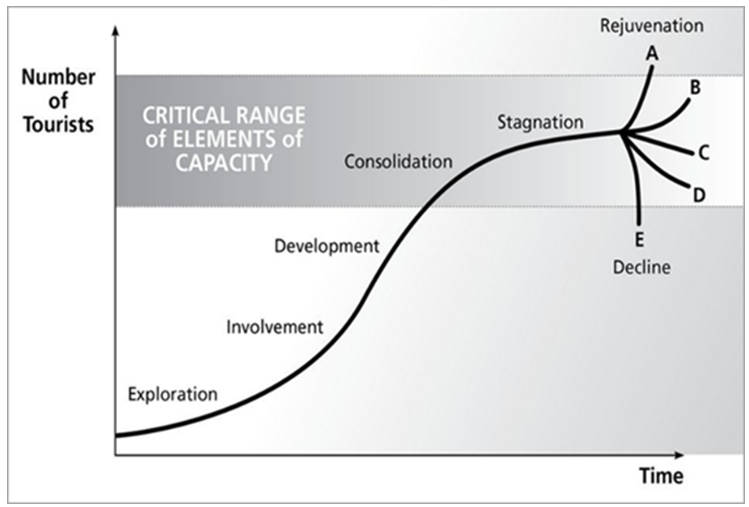
While Prof Butler agrees, in principle, with the idea of accepting limits for sustainable development, he raises the questions about who sets these limits, on what criteria, and how they are enforced. The multifaceted nature of tourism, involving numerous stakeholders and interests, complicates the process of defining and implementing limits; hence the need for nuance, balance, and, by implication, a less ideological approach.
Condescension in tourism discourse
Linked to the unhelpful way in which tourism is viewed by many academics is the longstanding propensity to diminish other people’s holiday habits and preferences.
Prof Butler:
“[W]e have had the emergence of many specific minority interests and concerns in tourism, most often negative in outlook and tone about most forms of tourism, particularly mass tourism, […] and almost always arguing for forms of tourism that are not popular with most tourists.
“While there may be good reasoning behind some of those platforms, views are often expressed from what one suspects is felt to be a superior position by the exponents, reminiscent of the old tourist/traveller arguments that still occasionally emerge.”
While travel & tourism experiences hold personal significance, they are generally viewed as unimportant. Recent events (not least COVID-19) however, may have shifted this perspective, with those in power recognising the (economic) importance of the fragmented industry that sells and facilitates these experiences.
Don’t miss ‘Tourist vs traveller: What’s the difference?’
In essence, while tourism has significant drawbacks, it plays a crucial role in various aspects of global dynamics. Despite being a harmful polluter and contributor to global carbon emissions, tourism serves as a means to transfer significant amounts of money from the global north to the south. Degrowth would come at a significant cost to many regions and less developed states in particular.
Prof Butler refers to the often hard-earned enjoyment derived by tourists and the shared experiences between hosts and guests as critical aspects of understanding the industry. Anyone who does not appreciate the importance of tourism pleasures to everyday people and their families “has no place in academia”, least of all in the area of tourism research and education.
Academics need a reality check
Prof Butler is generally positive about the growth of tourism studies, acknowledging the increased depth of our knowledge, albeit with certain caveats. He articulates his frustration with disciplinary silos, and scrutinises the proliferation of journals that publish articles, often of low quality, either for profit or to meet institutional pressures.
“We all need to pull back a bit and consider if our opinions, which is all they really are, […] need to consume increasingly scarce resources in order to be seen.
“Where do we look for inspiration? [R]arely in academic journals.
“I consider it wonderful if one in a hundred articles actually contributes an idea or a finding which makes me stop and think, or even more rarely, tells me something of significance that is new.”
In conclusion, Prof Butler underscores not only the advantages and disadvantages of tourism but also its inherent complexity. He urges a more pragmatic, nuanced, and balanced approach to address its complex challenges.
This contrasts with the current focus of many academic publications on certain perspectives, critical turns, and ideological movements that often fail to accurately reflect the touristic experience or address the challenges facing the industry.
If he were able, Prof Butler would prescribe a reality check.
What do you think?
Share your own thoughts in a comment below. Or write a deeper “GT” Insight. The “Good Tourism” Blog welcomes diversity of opinion and perspective about travel & tourism, because travel & tourism is everyone’s business.
“GT” doesn’t judge. “GT” publishes. “GT” is where free thought travels.
If you think the tourism media landscape is better with “GT” in it, then please …
About the author
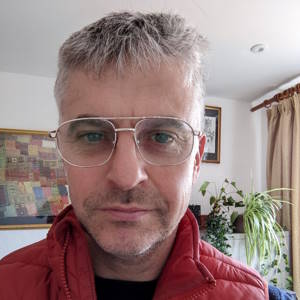
David Jarratt is a Senior Lecturer in Tourism Management within the School of Business at The University of Central Lancashire (UCLan) in the UK. Dr Jarratt’s research interests include tourist motivation, well-being, and sense of place. He has been researching the experiences of visitors to the British seaside. More recently he has considered current issues relating to technology and the environment. (ORCID)
About the Tourism’s Horizon Interviews
“Good Tourism” Insight Partner Tourism’s Horizon: Travel for the Millions, in collaboration with “GT”, has sought the candid views of well-known and respected experts on tourism’s past, present, and future.
The Tourism’s Horizon Interviews involves Jim Butcher, Vilhelmiina Vainikka, Peter Smith, Saverio Francesco Bertolucci, David Jarratt, and Sudipta Sarkar as interviewers. The “Good Tourism” Blog will publish their highlights and commentary as “GT” Insights.
Read the full transcripts of each interview on Tourism’s Horizon’s substack.
Featured image (top of post)
Portrait of Professor Richard Butler with the quote: “[Don’t] let wishful thinking take precedence over logic”.


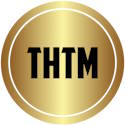
![Prof Richard Butler on tourism's challenges and academia's inadequacies 5 Professor Valeria Minghetti: "[B]e curious. Never stop asking yourself questions. Curiosity and the desire to find solutions is what makes a difference ..."](https://www.goodtourismblog.com/wp-content/uploads/2024/05/Professor-Valeria-Minghetti-300x225.jpg)
